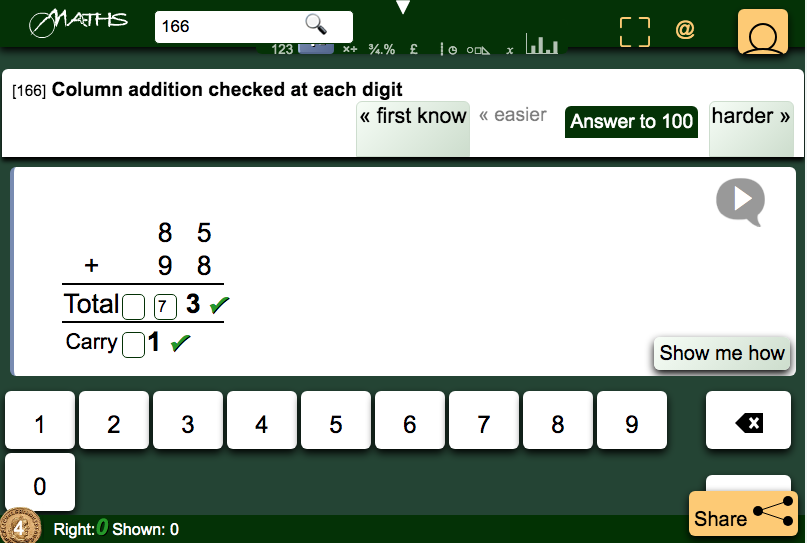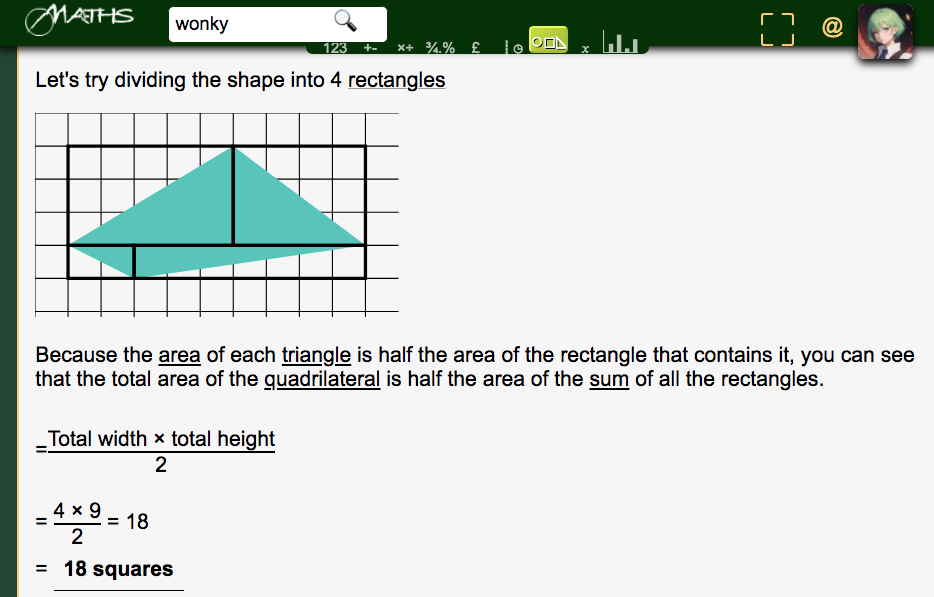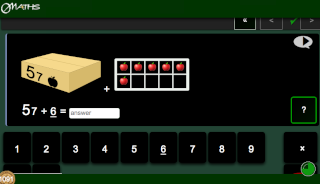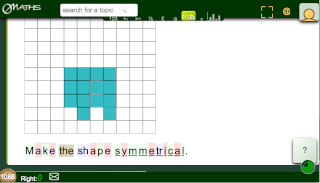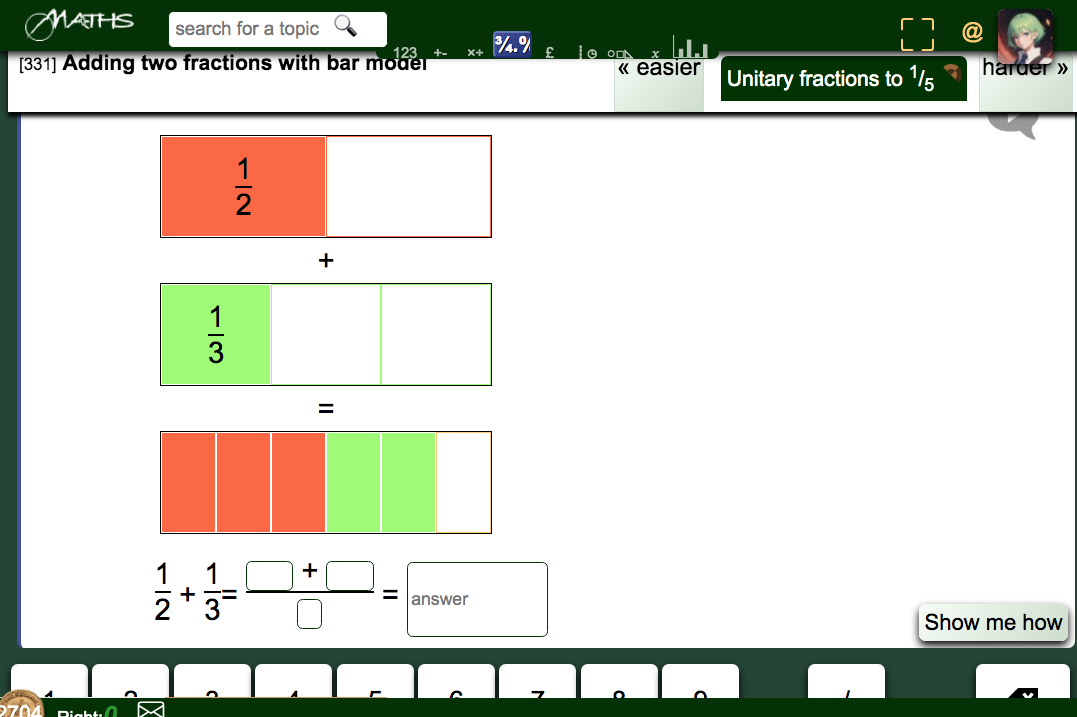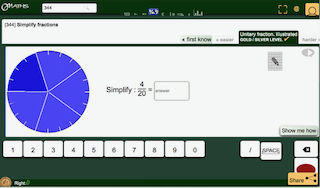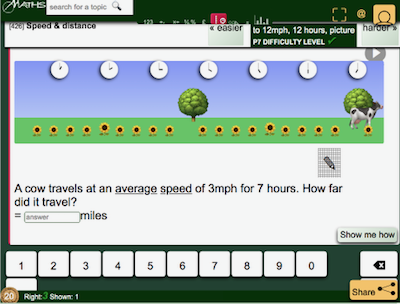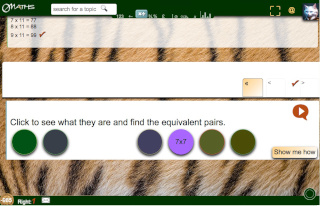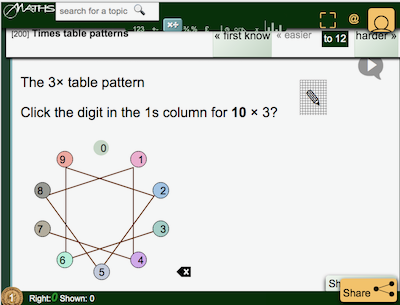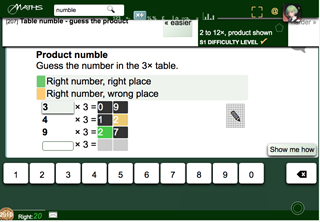More than you ever wanted to know about 0maths.
All about 0maths (that's zero maths, not
omaths).
Who?
0maths is developed, maintained and owned by Influenca Ltd (© 2020-2026).
It began as a personal project but has been a full time occupaton since Lockdown. I am not a teacher but a software engineer with a (long ago) background in mechanical engineering. Engineering can be thought of as science-driven design and this approach is very evident in 0maths:
-
Mostly not multiple choice
If you look at the range of maths sites available, one feature they mostly share is that the answers are multiple choice. You could be forgiven for thinking that the popularity of multiple choice must be because of its educational superiority. This is not the case. Multiple choice dominates simply because programmers want an easy life. In using typed answers we have to be sensitive to the potential range of right answers eg 1/2 , 2/4 , 0.5 may all be correct answers. Algebraic answers create a whole new realm of complexity. It's not easy, but it's worth it:
Typed (or written) answers are about formulating the correct answer, and this may be a different thought process to recognising a correct answer.
Multiple choice questions are one tool in the learning tool kit and we do use them for some questions. However, curious things happen with multiple choice answers and we aim to capture these effects beneficially, rather than have them battering learners haphazardly.
- Multiple choice questions can be hacked. It may not be necessary to calculate the correct answer if there's another way to it. For example if the question is 245842 - 239723, and the options are are 5946, 5872 and 6119, a bright student will see the question as even - odd = odd and will be able to tell you that the answer is 6119 without doing any calculation at all.
- Multiple choice platforms that allow multiple attempts may involve simply clicking at random. No learning happens this way.
- Neural pathways are reinforced on clicked answers. It does not matter if they are right, the answer that is clicked will be remembered.
- But multiple choice where it best aids learning
If the options are consistent, they will be absorbed a little and associated with the question.
The great challenge of multiple choice questions is making all answers sound convincing which means the options presented end up being fairly consistent. Let's say we have the question:
8 x 7 =?
and the answers presented are:
52, 54, 56, 58
All answers will be remembered associated with the 8 (and 7) times table, particularly if the same answers are presented each time.
0maths uses this side effect positively. For instance, if all the answers presented are in the table being learned, that can help with tables learning. We take this a step further. Consider this question:
2 x 7 = ?
with these answers:
2, 4, 6, 8, 10, 12, 14, 16, 18, 20, 22, 24
Children spot that they can just count from the left and click on the 7th given answer. They will be pleased with themselves because they got it right and got one over on The Man.
But what just happened? They just got a little more familiar with the numbers in the 2 x table. Because the question was arranged to be hackable, they got it right and the memory (as opposed to the calculation, which they did not do) of 2x7=14 has been reinforced.
For the next question, they may use an earlier question as a starting point (ie if the question is 8x2, they may count on 2 from 14); this will reinforce the earlier question.
Besides, typed answers allow our unique:
-
Never wrong, only not yet right
0maths' unique never wrong, only not yet right approach was developed for my own youngest daughter who suffered from maths anxiety. She was so scared of getting any answer wrong that she could no longer think.
Apart from its relevance to maths anxiety, this approach has deep implications for all learning:- We don't actually learn by our mistakes, we learn by getting things right.
- Getting an answer wrong is unhelpful - sometimes children have learned it wrong and they just accept "I'm a 7/10 kind of guy". The not-yet-right approach means they will have to get it right to move on, giving them the opportunity to override first learning.
-
Brain chemistry
Most maths apps have an undue emphasis on speed - whether it be competing against another player or some sort of ticking bomb. From an educational standpoint, quick calculation is an indicator that the result is coming (at least in part) from long term memory but pressure to work fast does not help store memories. In fact, competition produces adrenaline - the fight or flight chemical. Adrenaline increases heart rate, diverts energy to motor muscles and actually shuts down logical thought. Instead, with a stream of only right answers and a reward for each one, 0maths targets dopamine (the "Eureka! I'm so good at this!" brain chemical). Dopamine has been shown to increase attention spans and increase fact retention.
-
Previous answers accessible
This gives students a sense of progress - "look how many questions I've done." Seeing each individual question on the screen with a right answer is confidence boosting. The other effect of this is that they can scroll up the page to review previous answers, and scroll back down to 'cheat' by entering the answer, if its relevant to the current question. They will have to memorise this and will do this in a way that's helpful to them, such as saying it out loud a few times. This process is helpful to learning as long term memory is key to a lot of maths (times tables & number bonds, being obvious examples).
What?
0maths is a bottomless pit of rapid fire, randomly generated practice questions across over 500 topics including addition, subtraction, division, multiplication, percentages, units, fractions, factors, time, money, units, geometry, area and algebra.
It is suitable for all pupils but was particularly designed to embrace the needs of nervous learners with the following innovations:
- Adaptive learning. Questions which have not been answered optimally (wrong or slow answers, or 'show me' requested) are remembered, to be emphasised later in a pupil's learning journey.
- No 'submit' button. Answers are accepted as soon as they are correct.
- No wrong answers, only not-yet-right answers. Mistakes can be undone; answers can be checked and corrected rather than marked as irredeemably wrong. This puts the learner firmly in control.
- Hints are given in some cases (i.e digits transposed, units missing, read the question more carefully, etc)
- 'Show me'. Learners can see the worked solution to almost any question.
- No visible timer. People learn best when they are relaxed, so there is no visible ticking clock, though times taken for each question are recorded, and questions answered within an appropriate timeframe earn a reward (virtual coins and topic wedges).
- Easier / harder. Most questions (at the teacher's discretion) have easier / harder options. A child can, without shame, ask for an easier question and build up to the harder questions. This may involve easier (i.e. generally lower) numbers, or simpler technique, or the use of visual aids. In the same way, students can make a question harder. When children complain that maths is boring, what they really mean is that it's too easy or too difficult.
- First know . Either on request, or after repeatedly asking for help on a question, pupils are given prerequisite topics. An example of this would be if a child is unable to do questions in the 6 times table, they would then be directed to counting in 6's, or adding and subtracting within the 6 times table.
- Follow on Just as there are topics that need to be known in advance, there are topics which naturally follow certain question types. In the example of multiplication tables, a natural follow on would be areas of rectangles.
- The maths is the game. 0maths is engaging with features such as levels, streaks and rewards and does not rely on irrelevent games as sweeteners. A maths question at the right level is innately satisfying and produces dopamine - one of the brain's reward chemicals. Getting the brain engaged to the right way of thinking takes a little time and a few questions. Irrelevant games break the pattern of concentration and exacerbate ADD.
Where?
We're based in beautiful Aberdeenshire, Scotland.
0maths.com is hosted in the UK and all data is controlled from the UK.
When?
The first maths-for-kids script that eventually became 0maths dates from 2013 or thereabouts, aimed at the needs of a child who'd scored a few days off school with an injured foot.
In lockdown 2020, it changed gear. Like many schools, our own was struggling with the cycle of work being given, pupils printing the work, work getting back to teachers, getting marked, and feedback returned to pupils. The school pointed us to the many online resources but
two out of three of my children found them stressful - wrong answers and visibly ticking timers increased anxiety and reduced learning.
The third child got frustrated at having to play a pretty basic game between questions - a game that took longer than the questions. ("Can't I just do the questions?")
Since then I’ve been adding more to it. It’s been like climbing a mountain - every time the summit appears, it turns out not to be the summit. It’s now up to over 500 question types.
0maths has been designed to span the digital divide and be universally accessible. It should work fine on anything from a brand new laptop to a ten year old phone. Once it has loaded, it can be used without an internet connection.
Why?
School level maths is not about genius, it's about practice. Some kids need more practice than others, but more children are able to ace their maths than currently do.
Maths is important. It’s the language of the universe. It speaks truth to power. It teaches objective thinking. It makes complex problems easy.
We tend to take maths for granted because it was there right through our childhood, and once we know it, it's just so simple. Really though, maths is a series of spectacular, mind bending inventions which can be reproduced with a pencil and paper.
The very idea of counting is not inate. We (along with some other animals) can observe numbers to 4; beyond that we had to invent the means to record them. Many remote cultures use the number system "1", "2" and "many". The Romans invented the means for recording all numbers they had use for, but it was difficult to work with. The Indians did it better, perhaps magically, with the place-value system (though we credit the arabs for it).
Other leaps forward came centuries later: zero, negative numbers, the decimal point... etc, and that's just the numbers. Without algebra, calculus, trigonometry, statistics, how much of the universe could we master?
So, there you have it: maths is awesome, and everyone should be given whatever they need to understand it.
Why 0maths?
Yeah, the name's misleading - kids may suppose they are going to get to do no maths at all.
It's called 0 maths because it had to be short and simple enough that young children could type it in class and needed to contain the word 'maths'.
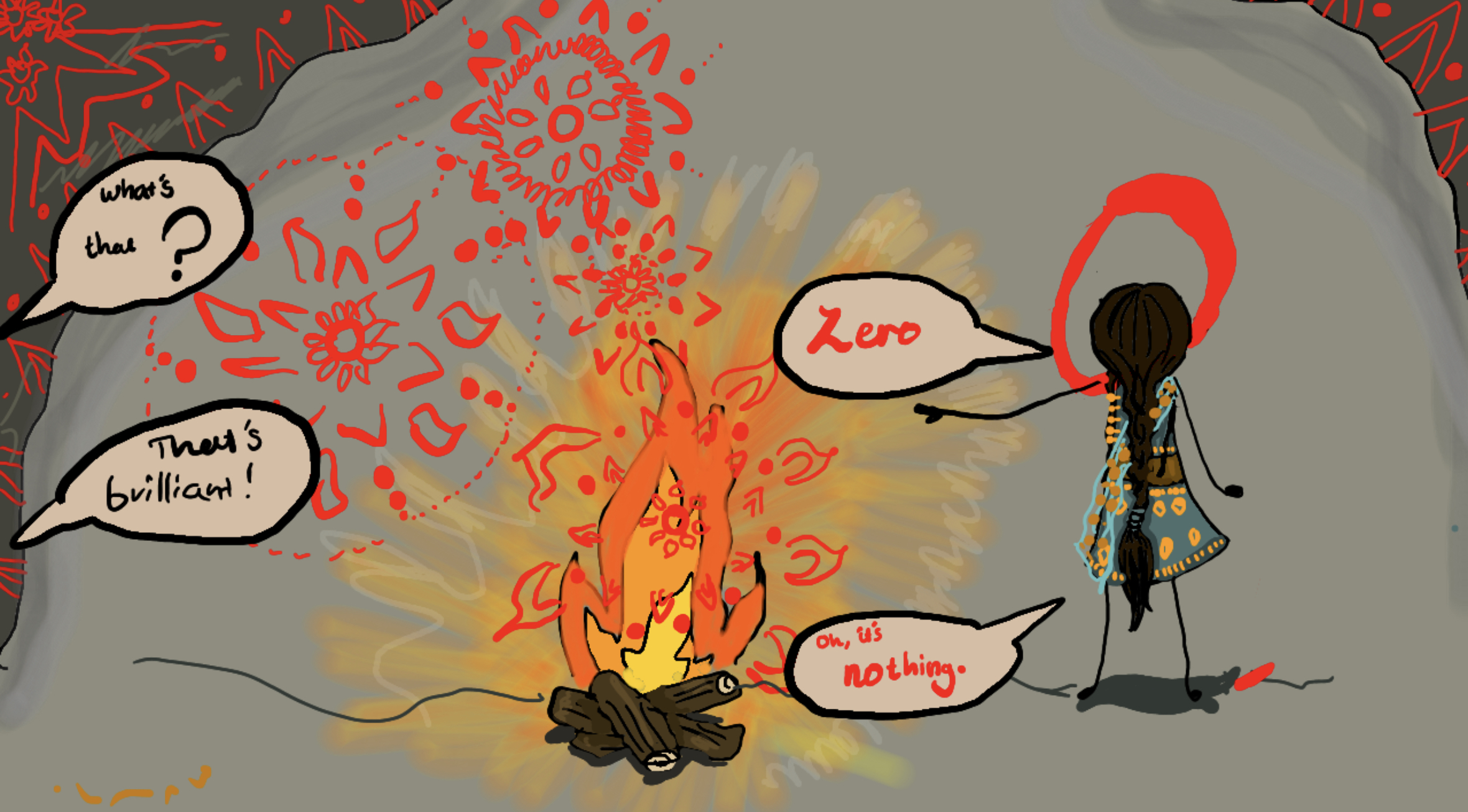
How?
How did 0maths come about?
Like many people, I got immersed in the agonies of education in Lockdown. My children - let's call them Bart, Lisa and Maggie - all got assigned work on worksheets and apps. None of them thrived on them.
 | Bart - who has ADD - hated maths because he felt he was bad at it. He had missed some basic pre-requisite knowledge so everything following that was very difficult for him. |
 | Lisa - bright and conscientous - hated the maths sites she'd been assigned because they weren't challenging and she was forced to play frustrating and irrelevant games after every question (made worse by trying to do them on a laptop with a trackpad). It was like a treadmill. You could see her enthusiasm for learning deflating a little with each session. |
 | Maggie - aged 6, had terrible maths anxiety. She took it very personally when she got a question wrong. Each maths session started with tears, and went downhill from there. She was too upset to think. She made so much noise about it that nobody else could think either. We dreaded even mentioning the word. |
Something had to change.
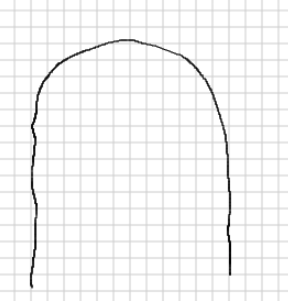 | Enter Dad. |
The apps could be much better. They didn't really encourage new learning at all - there seemed to be no time for it. I've had a life long interest in psychology and it seemed that a lot of undisputed insights were being ignored. Existing apps didn't encourage the right frame of mind. Before 0maths, I'd been running a software company for over 25 years. I could fix Lockdown Maths for my children.
Initially each question type was a sticking plaster - something that could cover what they needed for that week. The important thing was that I could embrace their learning styles.
- If a question's too difficult, let's make it easier until you get the base skills.
- You don't like wrong answers? Well, let's get rid of those - I'll just tell you when it's right. If it's not right you can have another look at it - I bet you'll work it out.
- Got this? What, already? Ok then, let's see where you can take this skill.
Version 0.1 was crude and clunky. It was just one bald Dad's zany project. Nevertheless, I thought others might benefit so I put a post up on Facebook. One morning about a week later I logged on to find that, in that moment, over 1,000 children were using that scruffy little prototype.
 | Enter Imposter syndrome. |
Having so many children looking to me for guidance felt like a huge responsibility.
What did I know about education? Why, in trying to please my own children, was the approach I came up with so different to all the other maths sites? Does a red cross and a low score teach anything? (No) Does a race against the clock help children improve? (again, no) Why are most of the other maths apps multiple choice? The good news for 0maths is that psychologists have done a lot of work on what makes learning effective (mostly not multiple choice, it turns out). If a child is going to entrust me with 10 minutes of their life, I owe it to them to ensure they learn as much as possible in that 10 minutes.
If people were using 0maths, I had a duty to make it as good as it could possibly be. Refining and expanding 0maths has been a full time occupation since Lockdown. I won't claim it's finished - it never will be; there'll always be new material to add. But it is very very good - kids using 0maths are likely to progress faster than kids using the old behemoths that my own kids so hated in Lockdown.
Terms and conditions
The website 0maths.com is operated by Influenca Ltd (hereafter we / us).
In using 0maths, you agree to the following terms and conditions:
0maths is provided on an "as is" and "as available" basis with no warranty express or implied as to its fitness for any particular purpose. We do not guarantee that information on the site will meet your requirements, that the site will be uninterrupted, timely, secure, or error free.
We accept no liability for any omissions or errors.
While we will make reasonable endeavours to make improvements (including fixing bugs and typos) we do not guarantee that we will be able to address these in a timeframe acceptable to you.
We will respect your privacy within the terms of the General Data Protection Regulations, as per our privacy and communications policies (below).
In using 0maths, you agree that:
- You will keep your logon secure
- If using 0maths as a teacher, you will take reasonable precautions to maintain the security of pupil logons.
- 0Maths remains the intellectual property of Influenca Ltd. You may make copies of questions but you may not make copies of the script files or otherwise transfer them to another server.
Privacy / GDPR
Personal information
The site can be used without supplying any personal information at all. However, if you log on, we (Influenca Ltd) record the following:
- For pupils:
- The name of their school.
- The name of their teacher.
- Their year group
- The (teacher assigned) name of their maths group
- Their name as a means of identifying them to their teacher. At the teacher's discretion, this may be be their full name, one name only, or a nickname. The default option when importing pupils is that we would trim the name to first names only, or first name and initial if 2 share a first name. In this case the full names are never sent to our server.
- A record of their work for each assignment set by their teacher.
- Additionally a username and password will be set for each pupil.
- For teachers:
- The name of their school.
- Their name as they wish to be known to pupils and alongside pupil initials on leaderboards.
- Their email address as a means to reset their password.
- A phone number (optional and marked as such).
- Additionally, a username and password is set.
- It is only possible to register as a pupil if linked to a teacher or a parent. There is no means of a pupil registering with their email address.
Sensitive Data
- We do not hold children's email addresses.
- In certain cases the name of the school a child is at may be considered sensitive data. It is suggested that in these cases the child's real name is not used.
- Other than the above, data held is not sensitive. Consequently, there are no password rules for pupils - they can even be blank, though if their password is blank we do remind that pupil to set a password at each log on.
- The likeliest source of an attack on a teacher's account would be a prank attack from within the class. For this reason the priority is that the password is memorable enough to not need writing down, and so the only password rule for teachers is that the password be at least 8 characters long.
Security
We take relevant security precautions, including the following:
- The site is secured by https encryption and is only accessible securely.
- Appropriate measures are in place to avoid a SQL injection attack.
- Appropriate measures are in place to avoid a cross site scripting attack.
We do our best to keep private information private, and expect you not to share passwords. For practical purposes, to keep things flexible in the classroom, teachers have the facility to view and / or change passwords for their students.
Additionally, teachers who are administrators have the facility to reset (but not view) other teacher's passwords within their school. This is to provide a safeguard against data loss in the event of a teacher leaving the school.
Cookies and Local Storage
- Unless a language other than English is selected in the settings, we don’t allow any third party cookies at all. If this should change we will notify you.
- If a language other than English is selected in the settings, Google will have the facility to set tracking cookies.
- If you are logged on:
- We store an ID on your device so that we can securely identify who has logged on.
Through this ID:
- A pupil's 0maths activities may be monitored by staff members at their child's school, including, but not necessarily limited to, their teacher.
- If they are logged on, we may use a pupil's performance data to suggest appropriate question types and help them to improve.
- We don’t share any specific data with 3rd parties outside of a child's school, other than with people registered as a child's parents or guardians.
- We may use a pupil's performance data in an aggregate and anonymous way, such as to draw conclusions about how pupils progress on 0maths, and we may share such conclusions but only in an aggregate and anonymous way .
- Regardless of whether or not you are logged on:
- We set one non-essential cookie:
- To allow us to record how users of the site progress over time, we record a random id (named 'rid') against which we record the time taken to answer each question, whether help was needed, the number of mistakes made, the difficulty level, and the question itself. The purpose is to be able to correlate strengths and weaknesses for future visitors so that we are better able to suggest appropriate questions to children, and to give you feedback on how times taken compare with others in general. This ID is not linked to any log on IDs and is independent of, say, homework submissions. This ID is confined to our site -we do not share it with others.
- We use several additional essential local storage (ie cookie-like) elements on your machine to record:
-
Nationality (for syllabus, currency etc).
-
School year (for syllabus).
-
Wedges won (i.e. tasks mastered).
-
Weaknesses (i.e. to suggest question types).
-
Current week no (if using week by week).
-
Current streak.
-
The time stamp of a visitor's last visit and the number of days in succession they have visited 0maths in order to appropriately increment a current 'streak'.
-
If a child has earned a place on a leaderboard, we also store their initials to save them typing them next time.
- The tasks selected
- Supplementary data for those tasks (ie chosen times tables, limits for addition).
- As the site is aimed at children, it may be wisest to not have them read the privacy policy before using the site. Consequently, essential cookies (ie both of the essential local storage elements and the logon ID cookie) are set even if you click 'not ok' to cookies. Without them the site won't work. In this case the non-essential cookie and all the non-essential local storage elements are not set, other than to record this preference.
Publicly displayed information
- If (and only if) a user answers a question such that they warrant a place on a leader board, we invite them to supply a maximum of three initials. These are stored both on our public leaderboard and on their machine by local storage, to save them typing next time.
- If a user is logged in at the time they get a place on a leaderboard, we also record their teacher's name, and their school's name on the public leaderboard.
- Leaderboards (i.e. a pupil's initials, and in the circumstances described above, their teacher's name and school's names) are displayed to other students who have earned a place on that leaderboard.
- Students have the option to decline their place on the leaderboard - in which case their time will be shown against the name anon, and neither teacher nor school are recorded.
Deleting information
Stored pupil data takes a few forms:
-
All questions they've answered, along with any errors or help asked for, together with a numerical id for the pupil, and a numerical id for the device.
-
For set assignments, details of each question asked, and any workings, including free hand sketchpad workings.
-
The originator of that data (ie the id, the log on credentials, and the teacher, school etc of the pupil).
When a pupil is deleted from an account, (or if the school / teacher account lapses, 90 days after the subscription ended) data in (1) is kept and data in (2) & (3) are deleted. The numerical id for the device is changed in our data when it is deleted so that if that pupil continues to use a device they've used previously, any data they subsequently generate can't be tied back to that pupil.
The deletion of data in (3) means it is not possible to associate the retained data in (1) with a human being. There would be a trail of answered question data tied together with the old numerical ID of the pupil, but they could only be known as 'pupil 123', not by so much as a nickname. If the same pupil returned with a different ID (even with the same log in on the same device), we would not be able to associate the two. The use to us is in keeping the data in (1) is in suggesting questions to future pupils.
Hosting location
We host 0maths.com in the UK, with Leaseweb UK.
Communications
We do not record any means of contacting anyone who registers as a pupil. As such, we will never contact pupils.
If you register as a teacher, we will only use your email address for matters connected to your account, such as password resets and notifications about changes to 0Maths.com that may significantly impact your use of the site. We'll send you as many of the former as you need, and no more than 12 of the latter per year.
Contact through the contact form can be totally anonymous. The email address field is optional (and is indicated as such). This is to enable children to report issues without being open to communication from an adult.
Our mission
Our mission is to give the skills to ace maths to every child who wants it. We want to close the attainment gap because education is the greatest social leveller. Yes, yes, I know, all maths websites say that. In our case though, we back it up with meaningful action. We have the most comprehensive neurodivergence adaptations available anywhere. Maths anxiety is 4 × more prevalent in children low SES households.
Our values
We strive
To provide an efficient learning experience
We will always strive to ensure that time spent learning maths on 0maths will achieve more than the same amount of time on any other platform.
To be science led
Where we differ from the herd will be because the pedagogy indicates it's the way to go. If new research comes along that suggests we should redesign 0maths to improve learning outcomes, then we will redesign 0maths. We will not be gimmicky.
To be good students
No wrong answers is at the core of 0maths. Mistakes are inevitable and can be corrected. We know that we make them too. We will always admit it when we're wrong, without hanging on to dogma.
To be responsive
If someone tells us they see a way for the experience we offer to be improved, we will strive to make it happen as soon as practicable.
Carbon neutral - kind of
Our carbon footprint is small - one small office with some computers. It's largely powered by a battery-backed solar array on the roof, so on sunny days we can be confident we're carbon neutral. On sunless, windy days the bulk of our energy comes from the world's largest floating windfarm.
But what happens when it's not sunny, and the giant offshore windfarm isn't turning either? Unfortunately, whatever energy suppliers claim, that energy comes from the grid and it's not carbon neutral at all.
Similarly, the energy used to get 0maths to you from our server (and the server itself) also has a carbon footprint. This is outwith our control but we do what we can to minimise the amount of data transferred. Unless we've just done an update we instruct your computer to use files from your last visit. In this way, the size of the download is reduced to around 1kB per question. That means you could literally answer 5,000 questions for the same data transfer as opening Facebook's home page for about 10 seconds.
We do not take part in any carbon offsetting schemes. They are entirely unregulated and there's not a reliable way to see what money spent on them buys (if anything).
 Nurturing maths awesomeness
Nurturing maths awesomeness






